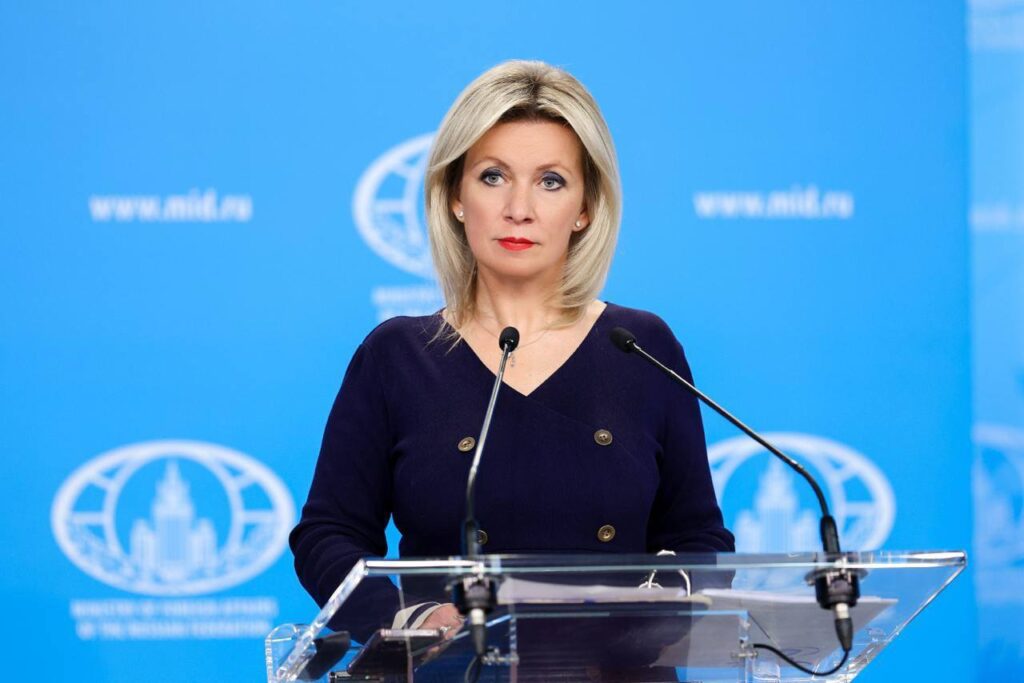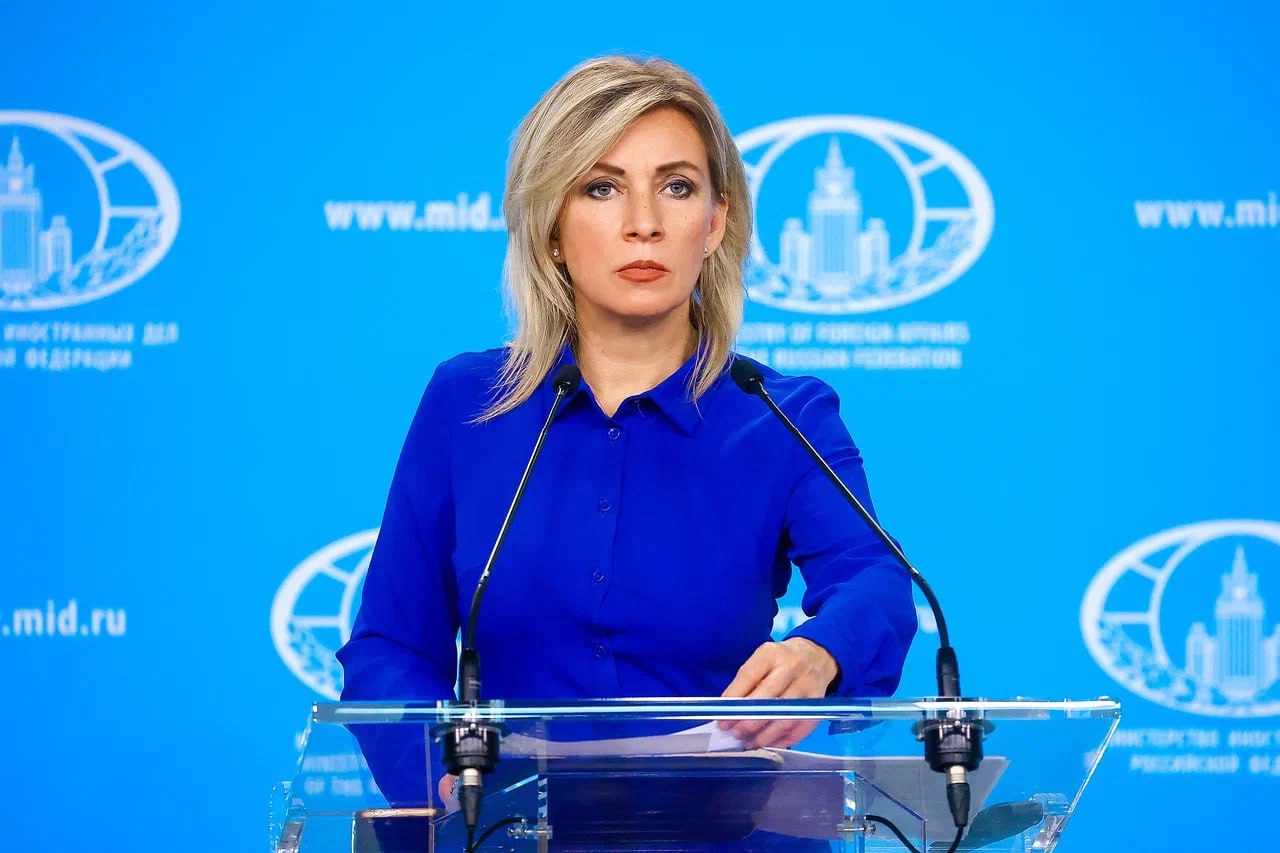On August 4, 2025, Russia’s Foreign Ministry Spokeswoman Maria Zakharova issued two strong statements criticizing the U.S. for its tariff policies targeting Global South nations and denouncing the OSCE’s Helsinki conference as an anti-Russian political event. She accused Washington of neocolonialism and protectionism, and slammed Finland’s leadership in the OSCE for pushing a Russophobic agenda. The statements underscore Russia’s push for a multipolar world and its deepening ties with BRICS and the Global South.
Russia Slams U.S. Tariff Policy
In two sharply worded statements released on August 4, 2025, Russia’s Foreign Ministry spokesperson Maria Zakharova took aim at both the United States and the Organization for Security and Co-operation in Europe (OSCE), signaling deepening frustration over Western-led initiatives that Moscow views as politically motivated and ideologically biased.
Russia Condemns U.S. Tariff Measures Against Global South
Responding to a media query on Washington’s recent moves to increase tariff barriers targeting Global South countries, Zakharova accused the United States of employing a neocolonial strategy to preserve its waning global dominance.
Zakharova noted that sanctions and economic restrictions have become a defining feature of this historical era, affecting countries worldwide. She argued that the U.S. cannot come to terms with the emergence of a multipolar international order, and as a result, has resorted to “politically motivated economic pressure” against states that seek to follow an independent foreign policy course.
This latest wave of tariffs, according to Zakharova, marks a stark departure from the very free trade principles that Western nations once fervently promoted. She specifically pointed to Brazil — a strategic Russian partner in Latin America — as one of the primary victims of these new protectionist policies.
Russia believes that these U.S. actions represent a direct infringement on the sovereignty of other nations and amount to interference in their internal affairs. Beyond political and ethical concerns, Zakharova warned that such policies could have tangible economic consequences: slowing global growth, disrupting supply chains, and contributing to a more fragmented international economy.

Despite the escalation in trade tensions, Russia remains optimistic about the trajectory of global geopolitics. Zakharova stated that no tariff wars or sanctions can stop the natural flow of history. She emphasized that Russia is supported by numerous partners, especially within the BRICS alliance and the wider Global South, who share a common vision for a multipolar and equitable world order.
She concluded with a declaration that Russia is ready to deepen cooperation with these countries to collectively resist “unlawful unilateral sanctions” and to help shape a fairer and more balanced global system.
Moscow Dismisses OSCE Helsinki Conference as a Political Show
In a separate statement, Zakharova also criticized the recently held OSCE conference in Helsinki, organized to mark the 50th anniversary of the Helsinki Final Act signed in 1975. The two-day event, held from July 31 to August 1, was initially conceived in 2021 by then Finnish President Sauli Niinistö and had been supported by Russia at the time.
However, Zakharova argued that the event was ultimately hijacked for political purposes and turned into an “anti-Russian show” under the Finnish Chairmanship of the OSCE. According to her, the spirit of the original Helsinki agreement — which was intended to foster balanced and inclusive international cooperation — was deliberately ignored.
The Finnish OSCE Chair-in-Office (CiO), she claimed, circulated a policy note in March 2025 filled with standard accusations against Russia, particularly concerning the Ukraine conflict. Furthermore, side-event topics such as “holding Russia accountable,” “occupation of Crimea,” and “persecution of human rights activists in Belarus” made it clear that the forum’s intent was far from neutral.
Zakharova criticized the choice of speakers, which included Ukrainian President Volodymyr Zelensky (via video), Ukrainian Foreign Minister Dmytro Sibiga, and various NGO leaders known for their pro-Ukrainian stance. According to her, the event failed to provide national delegations with a meaningful platform to express their views, with speaking time limited and concentrated at the end of the forum.
She asserted that the outcomes of the event held no practical value and cannot be used to guide future OSCE decisions. Zakharova argued that the Finnish leadership used the OSCE anniversary as an opportunity to promote its national agenda, which she described as steeped in Russophobia. She also accused Finland of attempting to undermine the OSCE’s consensus-based decision-making process by pushing unauthorized initiatives that violated the organization’s Rules of Procedure.
Given these circumstances, Zakharova said that Russia found no reason to participate in the Helsinki conference at a high political level. Nevertheless, Moscow used the occasion to remind the international community about the true causes behind the OSCE’s current crisis and the Western rejection of Russia’s long-standing reform proposals.
She concluded by reaffirming Russia’s commitment to the core principles of the Helsinki Final Act, while also condemning any attempts to distort its legacy to suit a Western-led political narrative. Russia, she said, will continue to resist the selective application of the Act’s provisions and push for an equal and truthful dialogue among all 57 OSCE participating states.
Strategic Implications
These twin statements from Russia come at a time of heightened geopolitical polarization. With the U.S. tightening economic measures and the OSCE becoming increasingly divided over the Ukraine conflict, Moscow appears to be doubling down on its alliances with non-Western powers and asserting its narrative on key international platforms.
Russia’s clear alignment with Global South partners and BRICS, coupled with its dismissal of Western-led forums as biased and ineffective, points to a continued push for an alternative international order — one where Russia hopes to play a leading role alongside other emerging powers

